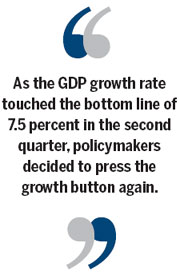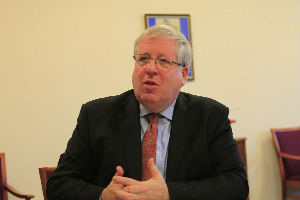Policymakers face a delicate balancing act
Updated: 2013-10-25 09:58
By Cindy Chung and Ben Chow (China Daily Europe)
|
|||||||||||
Monetary adjustments during fourth quarter expected to keep the economy bubbling
If third-quarter economic figures tell one thing, it is that Chinese policymakers are painstakingly trying to strike a balance between economic growth and money supply.
But the good thing is that they may have come close to the right point after they tested both tightening and loosening policies in the second and third quarter, respectively.
To be sure, credit expansion remains a major boost to the Chinese economy, the world's second largest. In the third quarter, new yuan loans amounted to 2.2 trillion yuan ($360 billion, 264 billion euros), an increase of 17.73 percent year-on-year. The growth beat the first quarter's 11.84 percent and the second quarter's negative 3.09 percent.
The correlation between credit growth and GDP expansion is evident. The relatively ample money supply pushed GDP to grow 7.8 percent in the third quarter, compared with 7.7 percent in the first and 7.5 percent in the second.
Top policymakers apparently loosened the monetary stance in the third quarter. They probably realized that the unusually harsh stance taken in the second quarter - when they declined to inject capital to the banking market although banks suffered from a credit crunch - was a bit overdone. As GDP growth touched the bottom line of 7.5 percent in the second quarter, policymakers decided to press the growth button again.
Credit growth has often been the first choice by central banks across the world when the economy does not fare well. But its effect could be small or slow for some economies that are not always sensitive to liquidity, as in the case of the US' quantitative easing policy.
In this sense, China is lucky. Its economy, relying heavily on manufacturing and construction, is highly sensitive to monetary policy changes. So policymakers can aptly resort to the monetary tool whenever they feel the economic slowdown is slipping beyond the limit. More often than not, the tool has proven effective in China.
But side effects of using credit expansion to boost the economy are obvious as well. Asset bubbles, the high leverage ratio and a possible delay of much-needed financial and economic reforms are just some of them.
Worse is inflation, dubbed by former premier Wen Jiabao as a tiger, which is baring its teeth. In September, the consumer price index hit a seven-month high of 3.1 percent. This has surpassed the psychologically important line of 3 percent, which was often used as a policy yardstick during Wen's time.

The new leadership clearly has greater tolerance toward inflation, as Premier Li Keqiang reaffirmed in July that a CPI below 3.5 percent was well within the comfort zone.
But if credit growth continues to be as robust as in September, the index will grow quickly toward, and possibly vault over, 3.5 percent.
The growing inflation trend has also been confirmed by a recent survey. According to the survey of about 500 retailers by Universal Consultancy during the National Day holiday, nearly 80 percent of them increased the price of their products. The figure was 73 percent a year ago. This shows that inflationary pressure is piling up.
By this standard, the monetary policy loosening in the third quarter, as a correction of the tightening in the second quarter, was a bit over the top. A policy swing from tightening to loosening in such a short period is not good for market stability.
Obviously, top policymakers are doing so to seek the right point of liquidity control. The contrast of the economic performance between the second and third quarters may suggest that the balance point could be in between.
Most likely, the monetary stance in the fourth quarter will be tightened from the third quarter's moderate loosening. But that tightening will not be as harsh as the tightening we saw in the second quarter.
The authors are analysts at Universal Consultancy in Shanghai, which specializes in research on the fast-moving consumer goods market. The views do not necessarily reflect those of China Daily.
(China Daily European Weekly 10/25/2013 page10)
Today's Top News
Mythbuster dispels fictions about China
Forum urges stableChina-Japan ties
NSA spying hurts US diplomacy
Carrier rocket sent to launch base for moon landing
Requirements cut for business startups
Study shows PM1 most harmful
Cold snap to sweep NE, N China
Paper apologizes for reporter's untrue stories
Hot Topics
Lunar probe , China growth forecasts, Emission rules get tougher, China seen through 'colored lens', International board,
Editor's Picks

|

|

|

|

|

|





